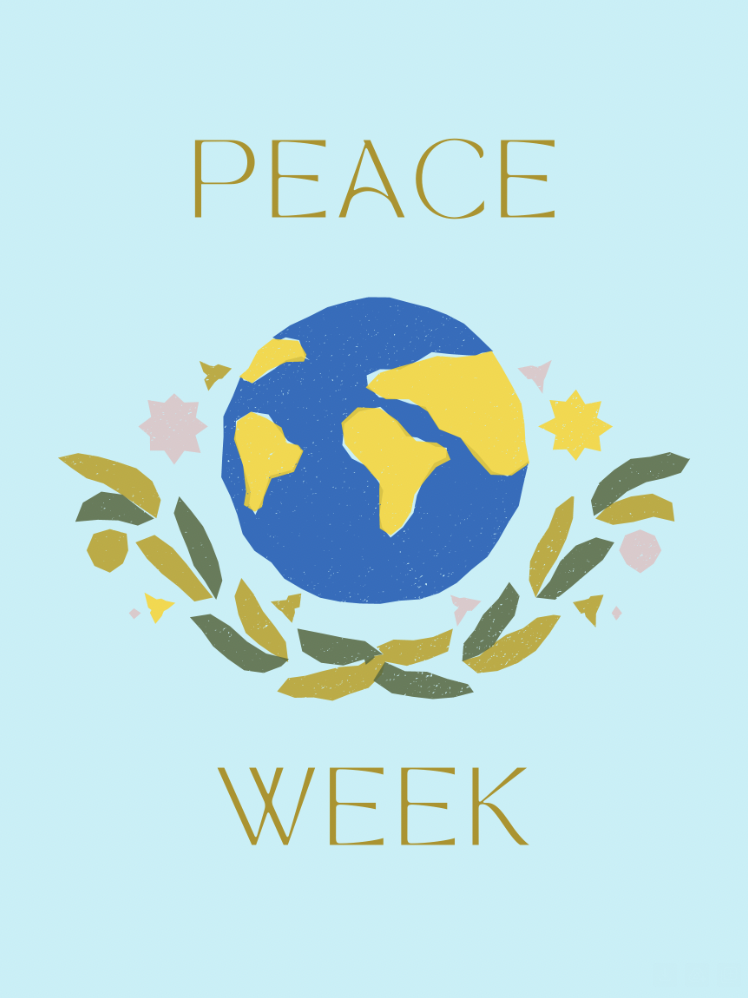Student Immigrant Alliance brings Peace Week to Hills

Editor’s note: This is a developing story; the contents are true as of March 15, 2024.
Beginning on Jan. 8, 2024, the Student Immigrant Alliance (SIA) of Pascack Hills released a series of daily announcements and emails concerning prevalent global conflicts in an effort to raise awareness. On Monday, Jan. 8, they highlighted the Nagorno-Karabakh conflict between Armenia and Azerbaijan.
This reflects the more recent clashes between the two countries, whose disagreements have not only occurred within the past few months, but date back decades.
In 1991, the first territorial disputes broke out between Armenia and Azerbaijan. Their connection to the Soviet Union caused a rising tension between the two nations.
Before its dissolution, the Soviet Union had control over both Armenian and Azerbaijanian regions. During that time, the Nagorno-Karabakh region was ethnically Armenian for the large majority of the population, but after the termination of the Soviet Union, a full-scale war occurred over the now proclaimed independent region of Nagorno-Karabakh.
This war resulted in Armenia gaining control over Nagorno-Karabakh, as well as several surrounding districts. It was estimated that 30,000 people died during this battle, as well as over 1 million were displaced throughout the fighting. Although this was the first major conflict between the two nations, it sparked a fire for future tensions to linger between them.
In recent years, Nagorno-Karabakh’s nearby regions and surrounding districts have witnessed a surge in tension once again, this time gaining more international attention. Some of the more recent clashes have raised more global concerns than expected.
In 2020, a 44-day war broke out, which resulted in an estimated 6,500 people killed and an Azerbaijanian victory. This battle was heavily assisted by drones that were provided by Turkey and Israel to Azerbaijan.
“Both countries have ties to Russia, a country involved in many global issues,” said Pascack Hills History teacher Nick Scerbo.
This can lead to a massive escalation in global concerns, especially if other large countries such as Turkey and Israel were to become involved.
Both countries have been accused of initiating hostility toward the other in between series of battles. In December 2022, Azerbaijan allegedly created a blockade, denying any passage of transport, such as food and other supplies to a large number of Armenians.
The population of the area was an estimated 90% Armenian, at about 120,000 individuals, although the land was argued as being deemed Azerbaijanian land. This was due to Russian leaders deciding the land distributions after the breakup of the Soviet Union. This provoked more conflicts about the territory soon after.
International concern over this conflict has risen significantly over the recent years, and many nations are closely monitoring it. The Minsk Group, shared between the United States, France, and Russia, has been involved in watching over and mediating discussions between Armenia and Azerbaijan.
Solutions for these victims are certainly a necessity because tens of thousands of civilians have been displaced or suffered major losses. Due to the historical roots of conflict between these two nations, Armenia and Azerbaijan will likely not have ensured safety for a long time. However, international mediators have been, and will keep trying to, ensure the most protection possible. This has been a problem for many years and it will likely not stop any time soon, but during that time there are ways everyone can help.
The ongoing conflict between Armenia and Azerbaijan has recently gained the most global attention yet, prompting for a peaceful and hopefully quick resolution due to the assistance of international mediators. The lasting battles between the two countries really highlights the problems with territorial disputes around the world and international communication. It also helps recognize various causes and effects of larger powers holding control over smaller ones.
As the world can only watch and hope for the best outcomes of ensuring safety for the victims of these conflicts, there are actions that can be taken. General citizens have the ability to contribute to the cause by donating to The Halo Trust, Armenia Fund, and Crisis Group. These foundations are the start to helping aid citizens in need.
Sources:
https://www.bbc.com/news/world-europe-66852070
https://www.npr.org/2022/09/19/1123515328/armenia-azerbaijan-nagorno-karabakh-explained
https://www.halousa.org/get-involved/give/appeal-for-nagorno-karabakh/
Armenia Fund https://www.crisisgroup.org/content/nagorno-karabakh-conflict-visual-explainer
Editor’s note: This is a developing story; the contents are true as of March 15, 2024.
Beginning on Jan. 8, 2024, the Student Immigrant Alliance (SIA) of Pascack Hills High School released a series of weekly announcements and emails concerning prevalent global conflicts in the effort to raise awareness. On Tuesday, the SIA chose to highlight the ongoing conflict between Russia and Ukraine known as the Russo-Ukrainian War.
The rising tension between Russia and Ukraine dates back to 2014. During that year, Donetsk, the regional capital of Ukraine, was seized by Russians. After Russian soldiers took control, Donetsk was then illegally annexed by Moscow.
Recently, Avdiivka has been a targeted location for Russian troops to take over. The area is seen as a gateway to Donetsk, making it a highly valued part of Ukrainian land. Russia is committing heavily into taking over this valuable land, weighing the losses of soldiers and supplies with the potential of overtaking Avdiivka. Russian military leaders determined that it is more important that this land is secured than to ensure the survival of more troops by backing out of this fight.
Ukrainian soldiers find themselves struggling from a lack of ammunition and proper military support. Imports of supplies are limited due to the U.S. Senate struggling to sign off on foreign affair budgets. Ultimately, the Senate is agreeing on $60 billion toward Ukraine assistance currently. It was not a unanimous decision to send this amount toward Ukrainian assistance, but was settled to be taken out of the budget toward the cause.
Within the past few months, tensions have escalated to a major degree.
“If the fighting continues to increase in tension and size, [the countries] will be drawn into a new Cold War,” said Pascack Hills History teacher Deborah Horn.
Ukraine is experiencing very little time to breathe, as Russia remains attacking them wave after wave with usages of air strikes, bombings, and other artillery attacks. Day by day, the pressure of the situation rises, and the likelihood of a major engagement occurring becomes more and more inevitable.
Currently, Ukrainian soldiers are experiencing relocation to more advantageous positions to defend Avdiivka, even if that means surrendering a part of the land. With the current lack of resources available, this front line battle between the two will only lead to a collapse of Ukrainian military force. Stepping back and letting Russian troops advance slightly allows Ukrainian soldiers to regroup and gain a different position of control.
Russian troops have already been seen closing the distances between their fortified lands and hidden Ukrainian trenches, and are said to be advancing quickly.
Ukrainian president Volodymyr Zelenskyy is planning on securing more western assistance, by visiting Berlin and Paris where he is expected to sign security pacts with German Chancellor Olaf Scholz and French President Emmanuel Macron. As well as this, an agreement with the UK was signed in January, strengthening Ukraine’s goal to become an official NATO member, to seek the proper assistance they require.
Until the point where Ukraine becomes comfortable with the situation they are in, and reaches the level of international assistance they require, these conflicts remain tragic for many soldiers and innocent victims of the battles. These fights have resulted in an increase in humanitarian crises, as well as many residents having been displaced in search for safer areas. Those who remain in close proximity to the fighting face many shortages of supplies such as food, water, and other essential medical requirements.
Horn also chose to elaborate on how the Hills community can better integrate the situation’s relevance into the school’s curriculum.
She explains how she likes to “connect situations from the past” to situations relating to the curriculum currently being taught, or past events to events currently happening in the world.
As Avdiivka remains the current center of attention for conflict between the two battling countries, it is important for students to be informed of the situations at hand.
While the proximity of the fighting may not be close to many, the situation can grow rapidly at any point, and result in a situation where everybody’s concerns rise. Similar conflicts have occurred both in close proximity to the students of Pascack Hills, as well as all around the world. Students must remain informed about situations such as these, in order to understand the complexities of global crises, along with the causes and effects.
Sources:
https://www.bbc.com/news/world-europe-68313306
https://www.cnn.com/2024/02/16/europe/ukraine-russia-avdiivka-battle-intl/index.html
https://www.cnbc.com/2024/02/16/russia-ukraine-live-updates.html
https://www.aljazeera.com/tag/ukraine-russia-crisis/
https://www.usip.org/current-situation-ukraine
https://eu-solidarity-ukraine.ec.europa.eu/helping-ukrainians-how-you-can-donate-and-engage_en
Editor’s note: This is a developing story; the contents are true as of March 15, 2024.
Beginning on Jan. 8, 2024, the Student Immigrant Alliance (SIA) of Pascack Hills released a series of daily announcements and emails concerning prevalent global conflicts in an effort to raise awareness. On Thursday, Jan. 11, they highlighted the recent clashes between Israel and Hamas.
To comprehend the current conflicts between these two countries, first, the longstanding tensions between Israel and Palestinian territories such as Gaza must be recognized and understood.
The recent disputes between the two countries can be traced back about a decade and a half. In 2007, Hamas was deemed the ruler of the Gaza Strip, and this takeover led to a blockade of the strip by Israel and Egypt. Due to this initial occurrence, by 2008, the first major signs of conflict between the countries took place, including Israeli air strikes and a ground invasion. Hostility between the two countries surged throughout the years, most notably in 2012, 2014, and 2021.
Hamas is a group with both political and militant divisions, with the goal of establishing an independent Palestinian state. The group was formed in 1987, and they have been criticized for their use of violence to achieve their goals.
Israel responds to Hamas’ acts of violence through military operations. Notably, some of the actions involved include airstrikes toward Hamas leaders, as well as ground attacks in order to protect as many civilians as possible. The Israeli government maintains that these defenses are necessary to protect the lives of innocent people.
There is a large consensus that the fighting should be concluded before the holy month of Ramadan, and if Israel’s hostages are not released by then, it would not rule out launching a full-scale offensive into the town of Rafah, on the border with Egypt, where it says many Hamas fighters are still holding out, surrounded by hundreds of thousands of displaced Palestinians.
Mediators are meeting in Paris on Friday to negotiate potential deals to pause the fighting in Gaza. Senior Hamas leaders such as Ismail Haniyeh and Khalil al-Haya are prepared to accept a six-week pause in fighting. During these weeks, they aim to free some of the Israeli hostages that are being held, in exchange for Israel freeing Palestinians held in Israeli jails.
Moussa Abu Marzouk, a senior Hamas official, said the negotiations are promising and can lead to “things [moving] in an excellent and good way,” and potentially leading to “lots of breakthroughs in the near future” toward peace between the two conflicting nations.
Hamas has agreed to several conditions such as the following:
- Hamas no longer demands an immediate truce, but instead they are open to negotiating one before the start of Ramadan around March 10.
- Hamas is not demanding that Israel fully withdraw from the Gaza Strip as of now.
- Hamas has lowered the number of Palestinian prisoners they want Israel to release in exchange for some of the 134 Israeli hostages they have in their custody.
International mediators continue to try to make peace between the two nations, maintaining that they can find a way to compromise or at least discuss their concerns without the threat of harming innocent civilians during their strife.
Defense Minister Yoav Gallant, a member of Israel’s three-man War Cabinet, has discussed potential flexibility toward their negotiations with Hamas officials. Gallant explained how they “will expand the authority given to our hostage negotiators,” and how they are making an effort to maintain some level of peace throughout this situation.
In the case of a lack of cooperation from Hamas officials, he also said that the Israeli army is “preparing the continuation of intense ground operations,” if negotiations cannot be met.
As global concern rises from the situation at hand, the world can only watch with hopeful eyes to see peaceful negotiations be met. International mediators have made progress in finding peaceful solutions to the existing conflicts and will continue making strides to stopping the battles. If some help toward civilians is seeked, reliable foundations such as Unisef can help protect the citizens and help toward ensuring the most safety possible.
Sources:
https://www.washingtonpost.com/world/2024/02/23/israel-hamas-war-news-gaza-palestine/







